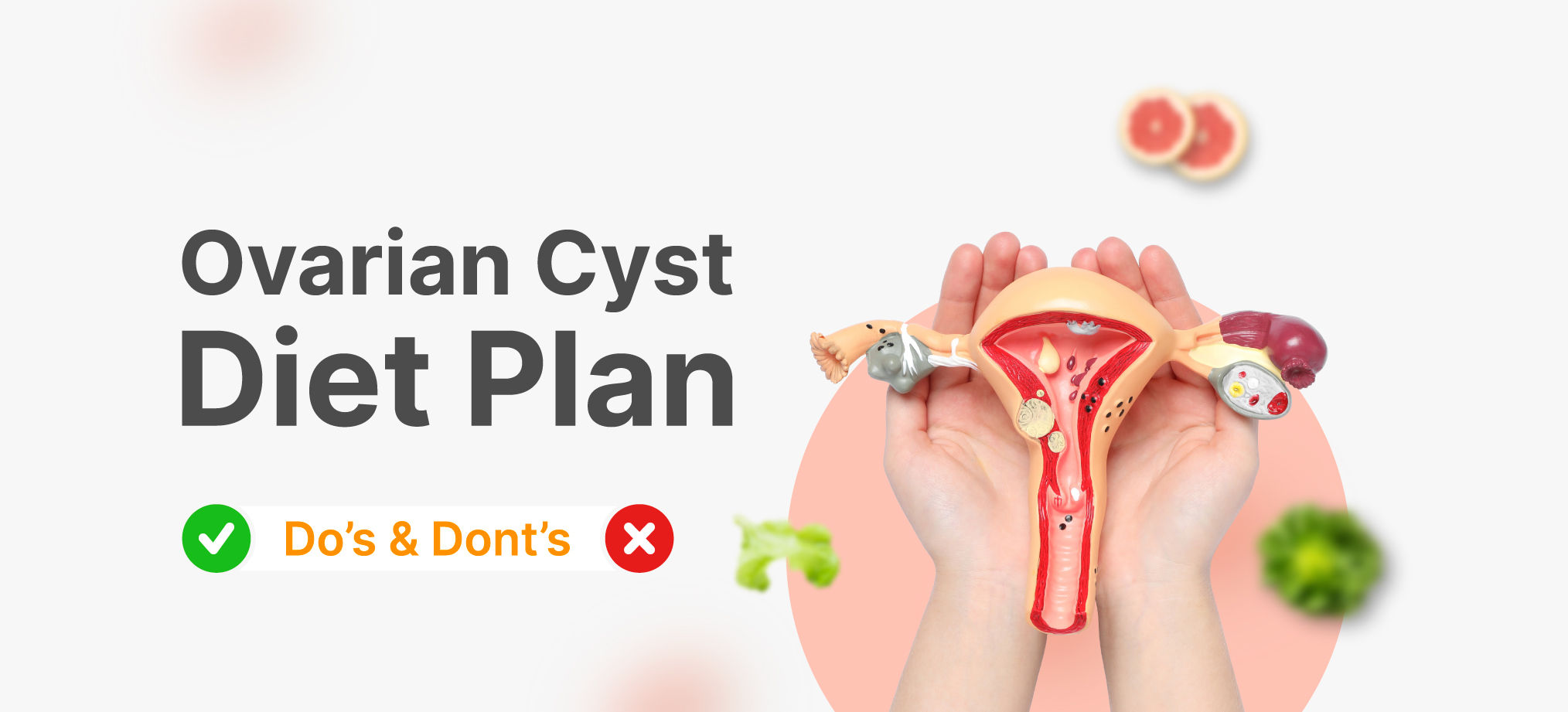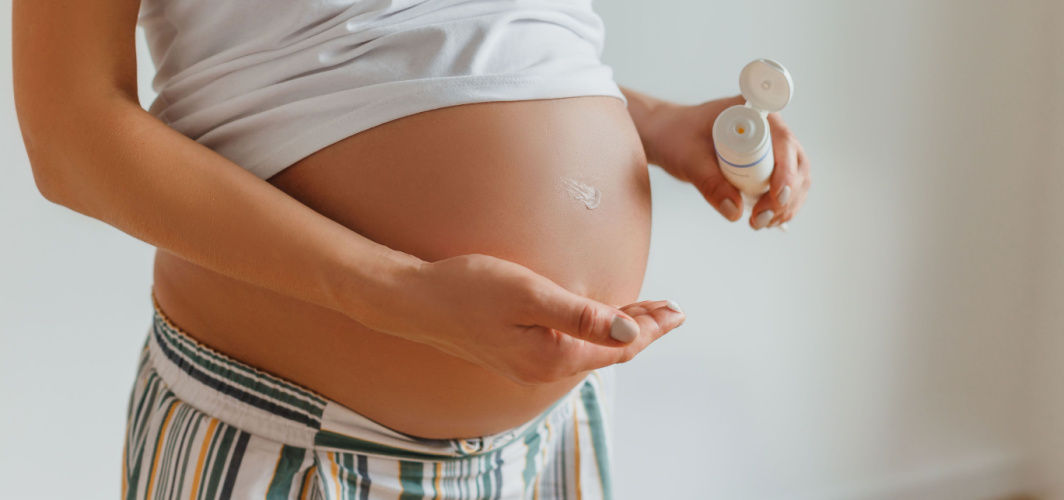Women Care
Ovarian Cyst Diet: What to Eat and Avoid in Ovarian Cysts?
By Apollo Pharmacy, Published on- 13 January 2023, Updated on -06 April 2025
Share this article
0
48 likes

An ovarian cyst is a common condition that menstruating women suffer from. It is a fluid-filled sac within the ovary that usually occurs due to hormonal imbalance, particularly estrogen excess. When these cysts are small, they are usually painless. As they grow large, they start to cause health complications like breast tenderness, pain during intercourse, pelvic pain before or during the menstrual cycle, uterine bleeding, irregular periods, spotting, and bloating.
If not treated promptly, these symptoms build on to progress to a more complex condition, known as PCOS (polycystic ovary syndrome).
Ovarian Cyst Symptoms
Some of the common ovarian cyst symptoms include:
- Pelvic pain, which can range from dull & heavy to sudden & sharp pain
- Pain during sexual intercourse
- Urge to urinate frequently
- Irregular periods
- Bloating
What Causes Ovarian Cysts?
Some of the most common causes of ovarian cysts include:
- Polycystic ovarian syndrome (PCOS): It can cause multiple small cysts on your ovaries.
- Pelvic inflammatory Disease (PID): Infection can spread from the pelvis to the ovaries, increasing the risk of cyst development.
- Endometriosis: May increase the risk of developing ovarian cysts.
- Use of fertility medications: Medicines that help in ovulation may further increase the risk of developing ovarian cysts.
Ovarian Cyst Diet Plan: 5 Foods to Eat
A balanced diet is essential to managing ovarian cysts. To ease the symptoms of this condition, include these 5 foods that kill cysts:
1. High-Fibre Foods
Phytochemicals found in high-fibre foods like oranges, lentils, pears, and peas prevent the re-absorption of estrogen hormone in the body. This helps to reduce the hormonal imbalance cutting down the chances of the development of ovarian cysts.
2. Lean Protein Foods
Lean proteins such as tofu, fish, and chicken help to maintain hormonal balance. Also, the consumption of lean proteins is effective in weight management which is crucial if you are suffering from ovarian cysts.
3. Omega-3 Enriched Foods
Fish, nuts, and seeds are rich in Omega-3 fatty acids. They help to manage hormonal imbalances caused by ovarian cysts.
4. Foods High in I3C
I3C stands for Indole-3-carbinol and is found in vegetables such as cabbage, sprouts, cauliflower, and broccoli. Regular consumption of these veggies causes the body to release estrogen and clear excess hormones.
5. Magnesium-Rich Foods
Bananas, cashews, almonds, avocados, and green leafy vegetables are magnesium-rich foods. Including these in the diet helps with cramp relief because of ovarian cysts.
Ovarian Cyst Diet: 5 Foods to Avoid
Mentioned here are foods that have been linked to the development of ovarian cysts or that can worsen the condition.
1. Red Meats
Avoid eating red meats such as pork, beef, and lamb. Consuming such items deteriorates the existing cysts and promotes the formation of new ones.
2. Fried Foods
Fried foods are cooked in refined vegetable oils. Consuming a lot of fried foods may cause rapid weight gain, which is a contraindication in the case of ovarian cysts.
3. Refined Sugar-Rich Foods
Refined sugar causes a major hormonal imbalance, which triggers the formation of new ovarian cysts and irritates the existing ones. Hence, you should avoid foods with refined sugar.
4. Alcohol
Toxicants such as alcohol are a big no. They disrupt the body's hormonal balance, resulting in increased chances of ovarian cysts.
5. Caffeine
Caffeine contributes to dehydration and inflammation, which contribute to the development of ovarian cysts. Avoid too much consumption of coffee and tea to reduce the risk of developing ovarian cysts.
The Bottom Line
With a good diet plan and strict adherence to it, one can evade the problems of ovarian cysts. Though diet and exercise are relative solutions to prevent the cysts from getting complicated, consulting a doctor to treat ovarian cysts is an absolute recommendation. If you're experiencing ovarian cyst symptoms don't wait to consult a gynaecologist when in doubt and symptoms are unrelenting!
Medically Reviewed by Dr Dhanunjay Reddy
Services
Women Care
Frequently asked questions
Ovarian (functional) cysts usually decrease with time within one to three months.
Some examples of food that should be a part of an ovarian cyst diet are a handful of nuts, watermelon, papaya, pear, and apricots.
Herbal teas, such as chamomile tea and green tea, are thought to be effective in ovarian cyst treatment. One can get instant relief from the symptoms by drinking 2 to 3 cups of chamomile tea per day. For more information on how to shrink ovarian cysts naturally, read this blog.
Meat and food products that contain saturated fats are known to trigger the symptoms of ovarian cysts.
Yes. Low-fat milk and dairy products are good to be included in the diet plan for ovarian cysts.
Leave Comment
Services
Recommended for you

Women Care
5 Tips To Prevent Stretch Marks During Pregnancy
Discover useful tips and techniques to prevent pregnancy stretch marks, ensuring your skin remains nourished and radiant throughout this beautiful journey.

Women Care
8 Steps for Woman's Personal Care Regimen
There is no shortcut to success. The same applies to skincare and hair care. Even though you apply makeup and hair styling products, the problems will pop out. So, follow a minimalistic approach to a woman’s personal care regimen. #ApolloPharmacy #WithHerAtEveryStage #Skincare #HairCare #PersonalCareRegimen

Women Care
Can You Exercise During Your Periods?
Want to know whether you can exercise during periods or not. Then, you should read this blog and know what types of exercises you can perform and what type of exercises you should not perform during periods.
Subscribe
Sign up for our free Health Library Daily Newsletter
Get doctor-approved health tips, news, and more.
